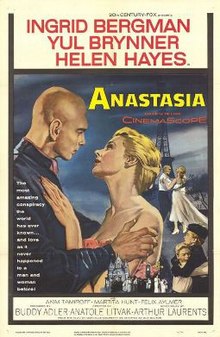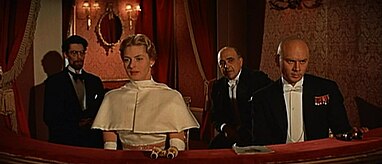
The House of Romanov was the reigning imperial house of Russia from 1613 to 1917. They achieved prominence after Anastasia Romanovna married Ivan the Terrible, the first crowned tsar of all Russia. Nicholas II and his immediate family were executed in 1918, but there are still living descendants.

Alexandra Feodorovna, Princess Alix of Hesse and by Rhine at birth, was the last Empress of Russia as the consort of Emperor Nicholas II from their marriage on 26 November [O.S. 14 November] 1894 until his forced abdication on 15 March [O.S. 2 March] 1917. A favourite granddaughter of Queen Victoria of the United Kingdom, she was, like her grandmother, one of the most famous royal carriers of hemophilia and bore a hemophiliac heir, Alexei Nikolaevich, Tsarevich of Russia. Her reputation for encouraging her husband's resistance to the surrender of autocratic authority and her known faith in the Russian mystic Grigori Rasputin severely damaged her popularity and that of the Romanov monarchy in its final years. She and her immediate family were all murdered while in Bolshevik captivity in 1918, during the Russian Revolution. In 2000, the Russian Orthodox Church canonized her as Saint Alexandra the Passion Bearer.

Grand Duchess Anastasia Nikolaevna of Russia was the youngest daughter of Tsar Nicholas II, the last sovereign of Imperial Russia, and his wife, Tsarina Alexandra Feodorovna.

Anna Anderson was an impostor who claimed to be Grand Duchess Anastasia of Russia. Anastasia, the youngest daughter of the last Tsar and Tsarina of Russia, Nicholas II and Alexandra, was murdered along with her parents and siblings on 17 July 1918 by Bolshevik revolutionaries in Yekaterinburg, Russia, but the location of her body was unknown until 2007.

Anastasia is a 1997 American animated musical historical fantasy film produced and directed by Don Bluth and Gary Goldman from a screenplay by Susan Gauthier, Bruce Graham, and the writing team of Bob Tzudiker and Noni White, and based on a story adaptation by Eric Tuchman. It features songs written by Stephen Flaherty and Lynn Ahrens and a musical score composed and conducted by David Newman. The film stars the voices of Meg Ryan, John Cusack, Kelsey Grammer, Christopher Lloyd, Hank Azaria, Bernadette Peters, Kirsten Dunst, and Angela Lansbury. Loosely based on the legend of the Grand Duchess Anastasia Nikolaevna of Russia, youngest daughter of the last Russian Tsar, Nicholas II, and set in an alternate version of 1926, the film follows eighteen-year-old amnesiac orphan, Anya, who, hoping to find some trace of her past, sides with two con men who wish to pass her off as the Grand Duchess to Anastasia's paternal grandmother, Dowager Empress Maria Feodorovna, amidst the rumors that the Grand Duchess had escaped the execution of the royal family. The film shares its plot with the 1956 film of the same name, which in turn was based on a play by Marcelle Maurette. Unlike those treatments, this version adds a magically empowered Grigori Rasputin as the antagonist.
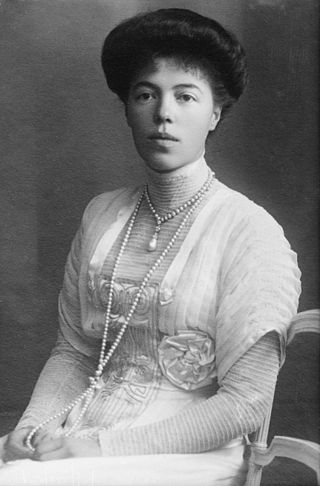
Grand Duchess Olga Alexandrovna of Russia was the youngest child of Emperor Alexander III of Russia and younger sister of Emperor Nicholas II.
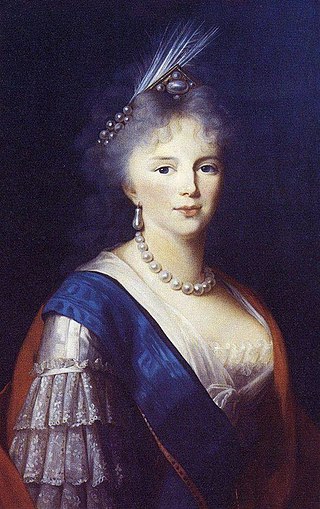
Maria Feodorovna became Empress of Russia as the second wife of Emperor Paul I. She founded the Office of the Institutions of Empress Maria.
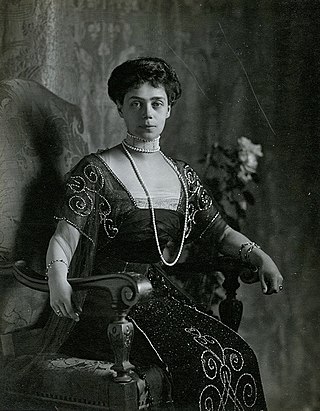
Grand Duchess Xenia Alexandrovna of Russia was the elder daughter and fourth child of Tsar Alexander III of Russia and Empress Maria Feodorovna of Russia and the sister of Emperor Nicholas II.

Sophie Freiin von Buxhoeveden, also known as Baroness Sophie Buxdoeveden, was a Baltic German Lady-in-waiting, in service to Tsarina Alexandra of Russia. She was the author of three memoirs about the imperial family and about her own escape from Russia.

Anya is a musical with a book by George Abbott and Guy Bolton and music and lyrics by Robert Wright and George Forrest. As they had done with Song of Norway (1944) and Kismet (1953), Wright and Forrest developed the musical score using themes written by a classical composer, in this case Sergei Rachmaninoff.
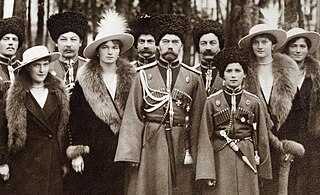
Members of the ruling Russian imperial family, the House of Romanov, were executed by a firing squad led by Yakov Yurovsky in Yekaterinburg, Russia, on July 17, 1918, during both the Russian Civil War and near the end of the First World War.

Princess Charlotte of Württemberg, later known as Grand Duchess Elena Pavlovna, was the wife of Grand Duke Michael Pavlovich of Russia, the youngest son of Emperor Paul I of Russia and Duchess Sophie Dorothea of Württemberg.

Prince Andrei Alexandrovich of Russia was the first son and second child of Grand Duke Alexander Mikhailovich of Russia and Grand Duchess Xenia Alexandrovna of Russia. He was also the eldest nephew of Nicholas II of Russia, the last Tsar.

Anastasia: The Mystery of Anna is a 1986 American-Austrian-Italian made-for-television biographical film directed by Marvin J. Chomsky, starring Amy Irving, Rex Harrison, Olivia de Havilland, Omar Sharif, Christian Bale and Jan Niklas. The film was loosely based on the story of Grand Duchess Anastasia Nikolaevna of Russia and the book The Riddle of Anna Anderson by Peter Kurth. It was originally broadcast in two parts.

The Red Cross with Imperial portraits egg is a jewelled and enameled Easter egg made by Henrik Wigström (1862–1923) under the supervision of the Russian jeweller Peter Carl Fabergé in 1915, for Nicholas II of Russia, who presented the Fabergé egg to his mother, the Dowager Empress Maria Feodorovna, in the same year.

Clothes Make the Woman is a surviving 1928 American silent historical romantic drama film directed by Tom Terriss, and starring Eve Southern and Walter Pidgeon. The film is loosely based on the story of Anna Anderson, a Polish woman who claimed to be Grand Duchess Anastasia Nikolaevna of Russia, the youngest daughter of the last Tsar of Russia, Nicholas II, and his wife, Alexandra Feodorovna. Anastasia was killed along with her parents and siblings by communist Bolshevik revolutionaries on July 17, 1918.

Anastasia is a musical play with music and lyrics by Stephen Flaherty and Lynn Ahrens, and a book by Terrence McNally. Based on the 20th Century Fox Animation film Anastasia, the musical adapts the legend of the Grand Duchess Anastasia Nikolaevna of Russia, who was rumored to have escaped and survived the execution of the Russian Imperial family. Many years later, an amnesiac young woman named Anya hopes to find some trace of her past by siding with two con men, who wish to take advantage of her resemblance to Anastasia.

Marcelle Maurette was a French playwright and screenwriter who is particularly well known for her play Anastasia (1952) which brought her international recognition, and inspired a film of the same name. It is not her only play centred on a woman with a tragic story. Many other works of hers feature historical or fictional heroines with dramatic lives. She was honoured with various awards and was a prominent French literary figure.

Alexandra Alexandrovna Tegleva, also known as Shura Tegleva and Sasha Tegleva, was a Russian noblewoman who served as a nursemaid in the Russian Imperial Household. As nursemaid to the children of Emperor Nicholas II and Empress Alexandra Feodorovna, she went with the family into exile in Tobolsk following the abdication of Nicholas II during the February Revolution, but was ultimately prevented from staying with them during their house arrest at Ipatiev House. She survived the Russian Revolution and married Pierre Gilliard, a Swiss academic who served with her in the Imperial Household as the children's French tutor. She moved to Lausanne as a white émigré and remained there the rest of her life. Tegleva worked with her husband to investigate and debunk the claims made by Anna Anderson, a Romanov impostor who pretended to be Grand Duchess Anastasia Nikolaevna.
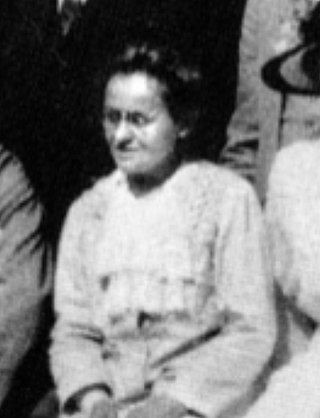
Elizaveta Nikolaevna "Liza" Ersberg was a German-Russian parlormaid who served in the Russian Imperial Household. The daughter of a stoker employed by Emperor Alexander III, she was hired by Empress Maria Feodorovna as a parlormaid at the Alexander Palace in 1898. She used her post to obtain a position at court for her friend Anna Demidova, who became a lady-in-waiting to Empress Alexandra Feodorovna.
